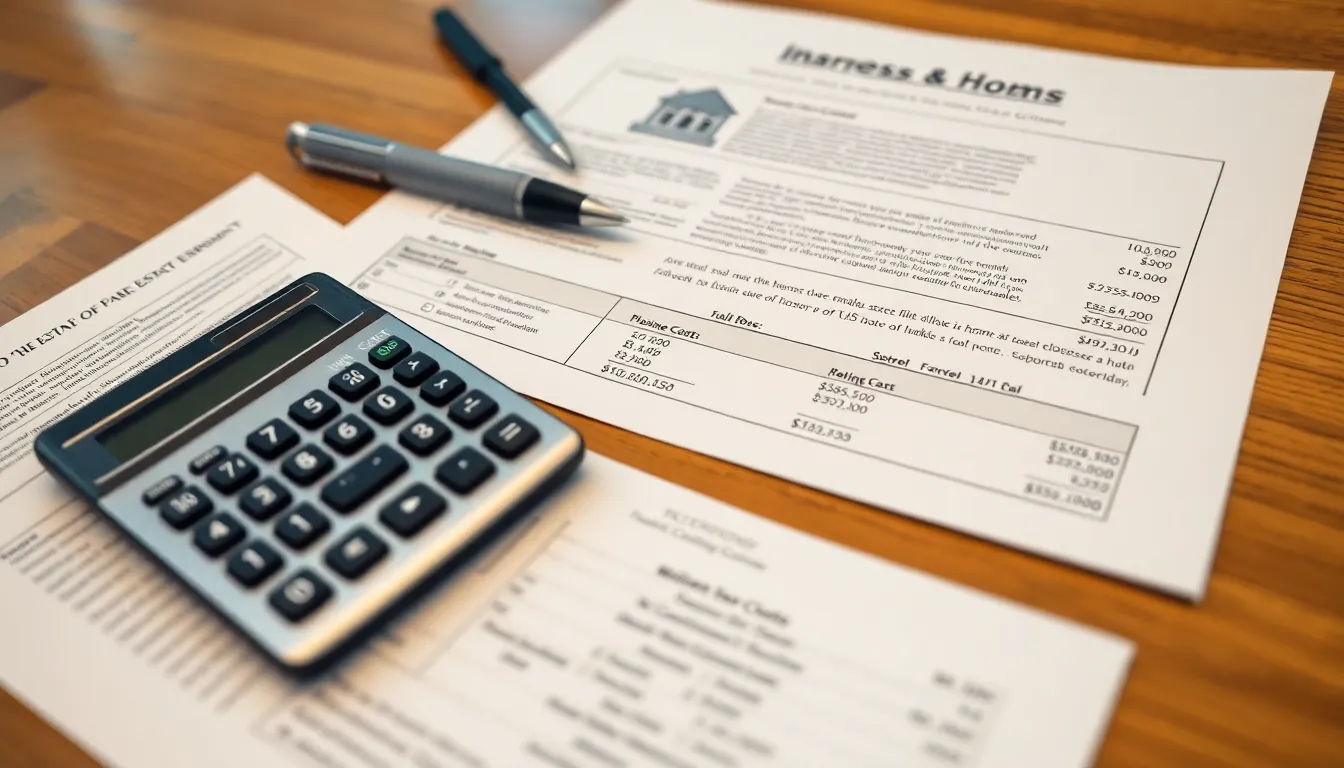Buying a home is an exciting journey, but it often comes with hidden expenses that can catch first-time buyers off guard. Closing costs represent a significant part of the financial puzzle, encompassing various fees required to finalize a real estate transaction. Understanding these costs can empower buyers to budget effectively and avoid surprises at the closing table.
Typically ranging from 2% to 5% of the home’s purchase price, closing costs include items like appraisal fees, title insurance, and loan origination fees. By grasping what these costs entail and how they can vary, buyers can make informed decisions and negotiate better terms. With the right knowledge, navigating the closing process becomes a smoother experience, allowing buyers to focus on what truly matters—settling into their new home.
Table of Contents
ToggleUnderstanding Closing Costs
Closing costs represent the additional expenses incurred during the purchase of a home, encompassing various fees and charges beyond the property’s price. These costs typically range from 2% to 5% of the total purchase price, making it essential for buyers to understand them for effective budgeting.
What Are Closing Costs?
Closing costs encompass various fees required to finalize a real estate transaction. These costs may arise from processing the mortgage, conducting title searches, and securing insurance. Buyers encounter these expenses at the closing meeting, where legal ownership formally transfers from the seller to the buyer. Preparing for these costs in advance helps buyers avoid unexpected financial burdens.
Components of Closing Costs
Closing costs can consist of multiple components, including:
- Appraisal Fees: Lenders require appraisals to determine the property’s value. Appraisal fees generally range from $300 to $700.
- Title Insurance: This protects against losses from disputes over property ownership. Title insurance premiums vary by state but typically range from $1,000 to $3,000.
- Loan Origination Fees: Lenders charge this fee for processing the mortgage application. It often amounts to about 0.5% to 1% of the loan amount.
- Inspection Fees: Home inspections assess the property’s condition. Costs range from $300 to $500, depending on the property’s size and location.
- Recording Fees: Governments charge fees to record the property transfer in public records. Recording fees usually cost between $100 and $250.
- Prepaid Taxes and Insurance: Buyers may need to prepay a portion of property taxes and homeowners insurance at closing. The amounts vary based on the property location and coverage.
Understanding these components equips buyers with the knowledge needed to navigate the closing process and manage expenses effectively.
Types of Closing Costs

Closing costs consist of various fees that contribute to finalizing a real estate transaction. Understanding these costs helps buyers prepare for the financial aspects of homeownership.
Lender Fees
Lender fees represent charges from the mortgage lender for processing a loan. Common lender fees include:
- Loan Origination Fee: Typically ranges from 0.5% to 1% of the loan amount, charged for processing the mortgage application.
- Underwriting Fee: Often between $400 and $600, this fee covers the lender’s cost of evaluating the loan application.
- Processing Fee: Generally $300 to $500, it accounts for administrative work associated with the loan.
- Credit Report Fee: Usually around $30 to $50, this fee pays for obtaining the borrower’s credit report.
Third-Party Fees
Third-party fees come from services provided by professionals not directly affiliated with the lender. Key third-party fees include:
- Appraisal Fee: Ranges from $300 to $700, this fee is paid to evaluate the property’s market value.
- Title Insurance: Costs between $1,000 and $3,000, protecting against losses from title defects and ensuring clear ownership.
- Inspection Fees: Generally between $300 and $500, these fees cover home inspections to identify structural issues or repairs needed.
- Survey Fee: Typically costs $300 to $800, this fee covers the survey of the property boundaries.
Prepaid Costs
Prepaid costs involve paying certain expenses upfront that pertain to the property. Important prepaid costs include:
- Property Taxes: Buyers often prepay a portion of property taxes, depending on the closing date and local tax laws.
- Homeowners Insurance: Lenders typically require the first year of homeowners insurance to be prepaid at closing, usually costing between $800 and $1,500.
- Mortgage Insurance: If applicable, this cost may involve upfront premiums for private mortgage insurance (PMI), particularly for loans with lower down payments.
Understanding these types of closing costs allows buyers to anticipate expenses and manage their budget effectively during the home buying process.
How Closing Costs Are Calculated
Closing costs are influenced by multiple factors, which can vary depending on the specific transaction, location, and lender used. Understanding these factors helps buyers anticipate and budget for closing costs effectively.
Factors Influencing Costs
- Location: Geographic area significantly impacts closing costs, with taxes and fees differing across states and municipalities.
- Home Price: Higher-priced homes typically incur larger closing costs due to increased taxes and fees linked to the property value.
- Type of Loan: Different mortgage types, such as conventional or FHA loans, include varying fees and requirements influencing overall costs.
- Lender Charges: Lender fees, such as origination or underwriting fees, vary by institution and can significantly affect total closing costs.
- Credit Score: Buyers with higher credit scores often qualify for lower interest rates and potentially reduced fees, impacting overall expenses.
- Negotiations: Buyers can negotiate certain closing costs with the seller or lender, affecting the final amount payable.
Average Closing Costs by State
| State | Average Closing Costs (% of home price) | Example Range (USD) |
|---|---|---|
| California | 1.5% – 3% | $15,000 – $30,000 |
| Texas | 2% – 4% | $2,500 – $4,500 |
| New York | 1.8% – 4.5% | $18,000 – $45,000 |
| Florida | 2% – 3.5% | $2,000 – $7,000 |
| Illinois | 2% – 4% | $3,000 – $6,000 |
| Pennsylvania | 2.5% – 3.5% | $5,000 – $8,000 |
Average closing costs vary significantly by state, emphasizing the need for buyers to consult local resources for precise calculations.
Tips for Reducing Closing Costs
Reducing closing costs can make home buying more affordable. Below are effective strategies for minimizing these expenses.
Negotiating Fees
Negotiating fees offers a practical way to lower closing costs. Homebuyers can discuss lender fees, such as loan origination and underwriting fees. Some lenders may agree to reduce or waive certain fees, especially for competitive offers. Additionally, buyers can ask sellers to cover part of the closing costs, which often occurs in negotiations. However, this may depend on local real estate market conditions.
Shopping for Services
Shopping for services helps buyers find competitive prices on closing cost items. Comparing quotes from different service providers, such as title companies, home inspectors, and appraisers, enables cost savings. Buyers should evaluate the quality of services and choose reputable providers. Obtaining estimates enables informed decisions and budget management.
By applying these tips, homebuyers can effectively reduce their closing costs, allowing for potential savings.
Understanding closing costs is crucial for any homebuyer looking to navigate the real estate market effectively. These expenses can significantly impact a buyer’s budget and overall experience. By being proactive in researching and negotiating these costs, buyers can alleviate financial stress and make informed decisions.
Utilizing local resources and comparing quotes can lead to substantial savings. The knowledge gained about the various fees involved and their potential to vary by location empowers buyers to approach the closing process with confidence. With the right preparation and awareness, they can ensure a smoother transition into their new home.




